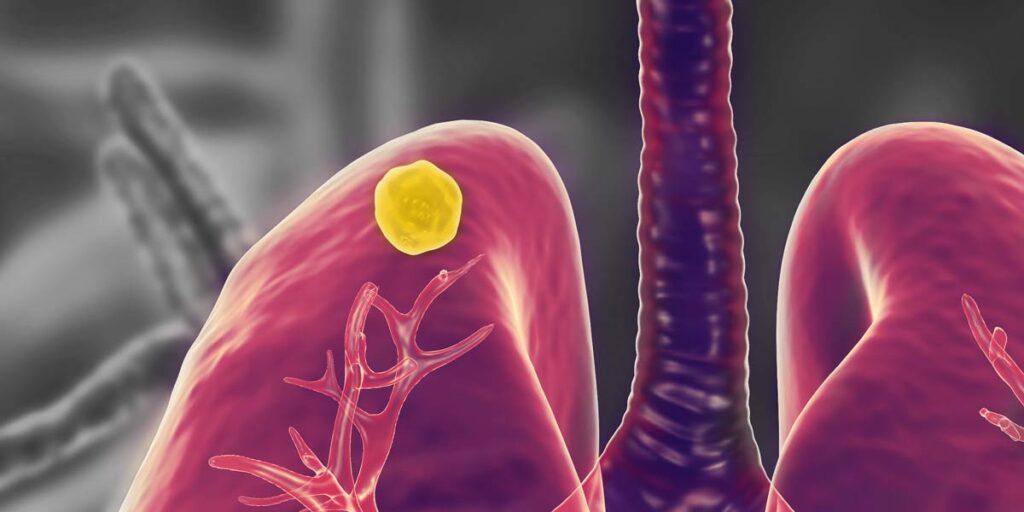What Is a Lung Nodule?
Lung nodules (pulmonary nodules) are abnormal masses that develop in one or both lungs. On a CT scan or chest X-ray, lung nodules—which are denser than normal lung tissue—will appear as white spots or shadows. Some lung nodules are smaller than a pencil eraser, while others can be the size of a golf ball or larger.
Causes of lung nodules
Lung nodules are typically caused by irritants, scar tissue or past infections. In rare occasions, a lung nodule can be malignant lung cancer or later develop into cancer.
Thankfully, most lung nodules are harmless and don’t cause any symptoms. According to the American Thoracic Society, up to 95% of lung nodules turn out to be noncancerous. Your physician will closely monitor lung nodules for any changes.
Discovering a lung nodule
A doctor will take several steps to decide if a lung nodule is cancerous or not. Your doctor will:
- Assess the appearance of the lung nodule. Your doctor will look at the size, shape and location of the nodule. Nodule size is a key factor in determining the probability of cancer. Most small nodules (less than 1/2 inch) are not lung cancer.
- Evaluate your risk factors. Your lifestyle habits and medical history can tell your healthcare team more about your risk for cancer. Diagnosing cancer will start with a detailed risk assessment.
- Request additional imaging tests. You may need to have more CT scans to see if the nodule changes. Nodule growth rate can be a warning sign of lung cancer. If the nodule remains the same for two years, it’s probably not cancer and usually safe to stop watching.
- Order a biopsy. Most people with lung nodules don’t need a biopsy. But if the nodule has grown or has concerning features, your physician will send you to a lung or cancer specialist for a biopsy. During the biopsy, the provider will pass a long, thin tube down your throat to get a sample of the nodule. Alternatively, your provider will guide a needle through the skin of the chest wall to obtain a sample. If the nodule can’t be reached through the throat or with a needle, surgery may be necessary to remove the nodule and parts of the surrounding lung tissue. After a biopsy, a pathologist will check the tissue sample for cancer, infection, scar tissue or other lung problems.
Risk factors for lung cancer
Certain factors increase your risk of having lung cancer. If any apply to you, your doctor may address lung nodules in a more aggressive way. Your doctor will consider these factors:
- Chronic lung disease
- History of smoking (or if you currently smoke)
- Exposure to dusts, metals and fumes that have been linked to cancer
- Older age
- Personal or family history of lung cancer
- Secondhand smoke exposure
Revealing cancerous lung nodules with a CT scan
A biopsy is needed to formally diagnose a cancerous nodule. However, imaging tests, such as CT scans, are the first step to find suspicious areas that may be cancer.
CT scans take images from different angles of structures inside the body. After the exam, a radiologist can view single pictures or a stack, which creates a 3D view. This gives your physician a detailed look at abnormal masses in the lungs.
Choose American Health Imaging for CT scans
Your doctor may want to continue monitoring lung nodules for any changes. If so, he or she may automatically refer you to the radiology department located in the hospital. But did you know this isn’t your only option for imaging?
American Health Imaging (AHI) offers a streamlined patient experience that allows you to avoid the complex hospital system. AHI is equipped with the most modern imaging technology innovations, including the Siemens 64-slice CT system, that allows for precise and reliable imaging studies for lung nodules and other lung cancer screenings. Costs for these imaging technologies are typically less than what you would pay at hospitals or hospital-owned facilities.
Fellowship-trained, subspecialty radiologists will provide your doctor with a written report of your exam and copies of images to review.* Request an appointment today.
CT scans don’t only detect lung nodules. Learn more about what CT scans can help your physician find.
